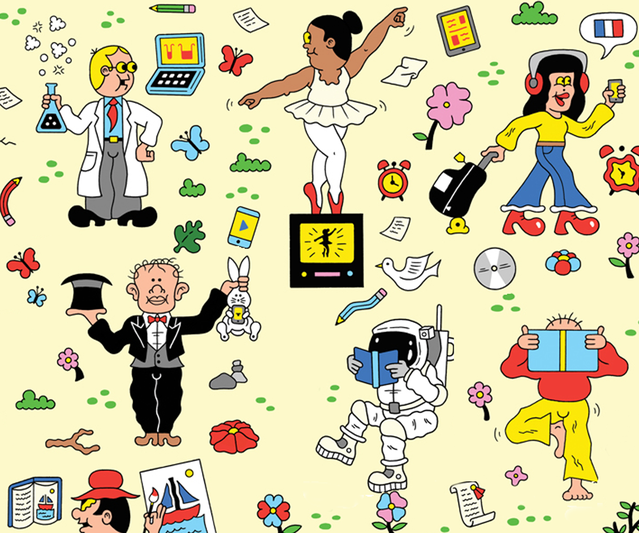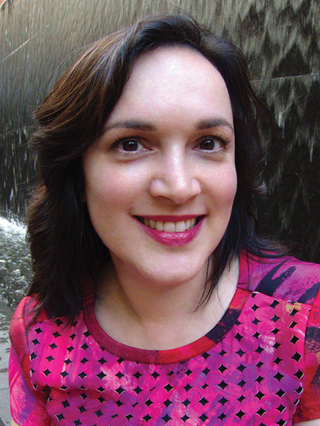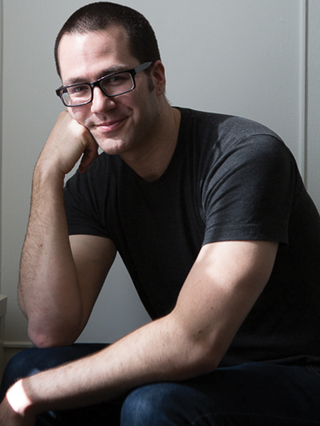The Golden Age of Teaching Yourself Anything
It's never been easier, or more important, to grow your own knowledge base. Here's what the science of self-directed learning can teach you.
By Carlin Flora published July 5, 2016 - last reviewed on February 4, 2019

Who can resist the romanticism of self-taught achievers? They didn't need school. They didn't need "the system." They needed only their passion and their talent to propel themselves to grandeur. Bill Gates, college dropout turned billionaire techie and world saver, is the modern apotheosis of the autodidact. His predecessors include Abe Lincoln, Virginia Woolf, Leonardo da Vinci, and Charles Darwin.
Paradoxically, almost no one is an autodidact in the purest sense, because while learning certainly does not require a school or institution, it does almost always require the help and guidance of other people, received in the form of conversation, books, DVDs, CDs, and now the treasure trove of documents, pictures, video tutorials, educational apps, uploaded books, and free courses that are available online. To survive in the "knowledge economy," we must all become self-taught learners, whatever our formal training was or will be.
All learning, even within the stuffiest education system, is crucially bolstered by self-teaching. The dancer takes a lesson once a week but will barely retain the teacher's suggestions, or advance in any way, without individual practice that incorporates careful self-assessment and adjustments. She might not technically be an autodidact, but she is a self-directed learner, to use the in-vogue term.
You can be a self-taught learner if you're in graduate school, or if you're 85 and want to take up chess. But what does it take to go from being a scattered, "lite" Googler of fleeting curiosity to a bona fide autodidact?
There are several components, but the real shocker is that more of us aren't embracing the current age of access to mastery of any topic. But that may not be so surprising—most of us were taught to be passive learners, to just "get through" school. It's easy to be lazy. The rewards of becoming an autodidact, though, include igniting inner fires, making new connections to knowledge and skills you already have, advancing in your career, meeting kindred spirits, and cultivating an overall zest for life and its riches.
One good reason to dive head first into self-initiated learning is that much of what you were taught is already obsolete. "Knowledge workers succeed not based on what they know, but rather how they learn," writes James Marcus Bach in his book, Secrets of a Buccaneer-Scholar. He dropped out of school when he was 14 and, in the early days of home computing, taught himself enough to become a software tester for Apple. He's now an independent consultant.
Bach's philosophy is rebellious yet inclusive: "Intellectual buccaneering is about self-education, but schools are OK, too. I've learned in schools, and I've learned from people who were trained in schools. I happily plunder knowledge wherever I find it. I don't seek the destruction of schools. I am out to dismantle something else—the popular belief that schooling is the only route to a great education and that the best students are those who passively accept the education their schools offer."
Blake Boles, a GenXer who graduated from the University of California, Berkeley (granted, he did design his own major) is a self-directed learning advocate who leads educational trips for teens. In his book, The Art of Self-Directed Learning, he writes, "The difference between self-directed learners and everyone else is as soon as school or work stops serving their life goals, they don't stick around. They ditch the well-trodden path, bust out the map and compass, and cut cross-country to virgin territory…self-directed learners take full responsibility for their educations, careers, and lives."

The Question of Intelligence
One of the best and most widely touted examples of online learning (one primarily for kids and teens) is Khan Academy, started in 2006 by Salman Khan, a former hedge fund analyst with four degrees from MIT and Harvard. He set out to make a few videos to tutor his cousin in math, an endeavor that exploded into a school-without-borders. Khan Academy's website says it has delivered over 580 million lessons in dozens of academic subjects. Learners have completed more than 3.8 billion exercises via the academy, or around 4 million a day.
In a 2012 interview with Psychology Today, Khan guessed that his site is a haven for precocious kids who love to learn. But he also said he believes the site can grow the ranks of smart and motivated children, not just reach the ones who lack enriching resources: "Our vision for the future is that everyone will be able to learn at one's own pace, and it should be competency based. In a world like that I think that you are going to expand the number of people who are precocious self-learners, and we can engage far more people because they are going to have a chance to take ownership of their learning and not be bored or lost." A few years ago, Khan took his mission to reform education into a brick-and-mortar setting by founding the Khan Lab School, in Mountain View, California, where kids work at their own pace using online programs, including his, and also collaborate on group projects. There are no grade levels or homework; self-directed mastery is the main focus.
"Standout autodidacts tend to have high IQs," says Jonathan Wai, Ph.D., a researcher at Duke University who has studied talented youth extensively. "A lot of research shows that smarter people are more likely to [engage in] self-directed learning. If smarter people really focus on a topic, they're going to advance more quickly. But across IQ levels, passion makes up for a lot. There are lazy smart people. There is individual variability in every part of the distribution of intelligence."
Boles says that he's observed most self-directed learners as "blessed with a genetic predisposition for independent thought, pattern recognition, and creative problem solving. They are, in other words, bright." But he touts the importance of having a growth mindset over intelligence, as does Khan Academy.
Your Learning Style
You might think that you're the type of learner who needs to hear a lecture on microbiology rather than read a book, or a person who couldn't possibly learn how to write a limerick. A rigorous analysis by Christian Jarrett, a cognitive scientist and the creator of the British Psychological Society's Research Digest blog, finds little evidence for believing in learning styles. "Although each of us is unique," he notes, "usually the most effective way for us to learn is based not on our individual preferences but on the nature of the material we're being taught." Novices learn better from examples; more expert learners benefit from solving problems. And combining activities, such as drawing a diagram of a cell after reading about it, improves learning for just about everyone.
There's much debate over whether children should simply follow their intellectual inclinations (be "unschooled") or be forced to learn core facts and concepts and demonstrate cultural literacy. "Even Bill Gates says you can't program computers without basic knowledge," says Wai. It is clear that a foundation is necessary for building knowledge upward and outward and that natural interest in doing so is also vital. In other words, both sides are right.
Ironically the Khan Academy has been criticized for promoting too much rote learning, thought to be the province of institutional education, not of the self-educators who watch his videos. Kahn disputes the notion: "The videos are focused on conceptual understanding. And we do have exercises that I would call 'deliberate practice.' Rote means just memorizing the formulas. Deliberate practice is: 'Look, we're going to have you solve a bunch of equations. And solving them will help you get into the rhythm and logic.' I believe that most of the time, if you've worked yourself enough, your brain starts to draw connections."
Deliberate practice nudges you "just past your current level of performance," Boles explains. It's analyzing exactly what you want to learn that day and pushing yourself until you master that little concept, which is challenging for you, but not too challenging. "Self-directed learners (like everyone else) tend to avoid deliberate practice at first because it's hard, scary, and time-consuming. But once you've tasted the fruit of its process—true mastery—then you know its value."

What's Holding You Back?
It's neither intelligence nor technique that holds people back from being successful self-taught learners, says Bach. It's insecurity. "Feelings of inadequacy stop curiosity," he says. In Bach's own field of competitive thinkers, he's learned that "most people who have ambition have a terrible fear that although they're good, they're not good enough or smart enough. It's debilitating." It ties back to the notion of cultivating a growth mindset; people with such a mindset don't worry about how smart they are. What matters is their openness toward developing their skills and talents.
Having purpose or meaning behind your goals can help you persevere. In his book, Boles tells the story of a 16-year-old girl who was intrigued by the notion of building something, but even more interested in gaining independence from her family. She apprenticed with a local architect for nine months. After that, she enlisted the guidance of others and built herself a tiny house, all her own. Deciding what's important to you, being open, and conquering fears all help.
You need not be a taskmaster to succeed as an autodidact: Bach is a procrastinator. But, after years of analyzing his learning and work patterns, he concludes that he must follow his own rhythms and whims and trust that he will produce good work eventually. When he's distracted, at least part of his brain might be processing the tasks he's actively avoiding. "I have to brood for long periods of time until I get my mental organization in place." Once, he spent an entire month procrastinating on a crucial project. Working on a different project helped get him into the right headspace.
Structure and Accountability
Structure, along with external pressure and reinforcement, is critical for many would-be self-directed learners, who, if left to their own devices, will just turn on the TV. Take learning a foreign language, something many claim they want to do, and some have to do to succeed in business or pursue other opportunities. In his book How We Learn, journalist Benedict Carey points out that an educated English speaker knows 20,000 to 30,000 words and hundreds of idioms and expressions. Gaining even half of those would take roughly two hours of practice a day for five years, by one estimate. Can the average person really muster the wherewithal? Well, it's a feature of our age that "there's an app for that."
Duolingo, an app that, as of 2015, had more than 100 million users, provides lessons in speaking, listening, and translation, and multiple-choice challenges for more than 20 languages. No one is going to shove your phone in your hand and open the app for you, but structure is built into the program and so is positive reinforcement. You can instantly see what you've answered correctly. If you miss a challenge, the app tells you how to improve. You can see how many days in a row you've spent learning a language, a tool to motivate you to not "break the chain." And in a nod to gamification, you lose "hearts" when you answer incorrectly.
Having a practical rationale for learning a language on your own helps, though. A 2012 Queens College and University of South Carolina study of
Duolingo found that its effectiveness hinges on the motivation of the participants: Those studying for travel gained the most, while people studying for personal interest, the least. Buy the plane tickets ahead of time and pin them above your desk.
Learning in a Vacuum
Our desire for real-world travel, despite the vastness of the virtual world, hints at the potential limitations of online learning. Take the case of Massive Online Open Courses (MOOCs). In 2013, thousands of people registered for individual MOOC instruction, but roughly 95 percent of them didn't complete their coursework, Boles points out, a dropout rate far higher than with face-to-face instruction.
We are saturated with information, Boles argues, but if we don't connect the dots of what we're learning to our current body of knowledge, we get lost in the sea of data and miss the aha moments of understanding. It's a disadvantage that can be overcome with a little human contact though: Other people can provide context and link concepts. "If you're focusing entirely on computer skills like graphic design or programming, then yes, the Internet alone can take you very far," he writes. Otherwise, you'll still need guides, if not teachers who charge money.
But as with other debates about education, it need not be either/or. Master graphic design online, then sign up for a conference to learn even more. Bach advises self-directed learners to find like-minded souls and join forces. "So much of my success comes from the large network of people I can draw upon to challenge my work, check it, and collaborate with me. If I didn't have that network, I would be a shadow of what I am."
Wai wonders if self-directed learning will remain a trend in small corners, or if those at the top of each field who attended established institutions will ever take online "e-credentials" seriously and open up the gates. "It's the challenge that autodidacts still face. Without the 'branding' of a school, how can they demonstrate their skills?"
It's a compelling question. It need not be resolved now for you to put down the remote and learn something new.
Carlin Flora, a former PT editor, is the author of Friendfluence: The Surprising Ways Friends Make Us Who We Are.

Meli Pennington
Want to know how to apply the false eyelashes sold in Korean drugstores? You’re in luck. There are more than 7 million makeup tutorials on YouTube. But when makeup artist Meli Pennington came of age in Alabama in the ’80s, she had only magazines to scrutinize. She emulated New Wave style, and although practicing on herself was frowned upon in her conservative Catholic home, she says, “My mom tolerated it because I was otherwise a good girl.”
Pennington majored in art history in college, which gave her broader reference points and ideas about beauty that go more than skin deep. She learned a lot in the ’90s, apprenticing under Dick Page, a legendary British makeup artist who is now the artistic director of Shiseido. “This was the grunge era, and he was known for ‘no-makeup makeup.’” She turned to fellow artists for guidance. “If I had to figure out a particular technique, I would try to find someone who had done that and learn from them.” Photographers have helped her hone the craft as well. “They’ve pointed out so much to me over the years.” She’s worked with photographer Patrick Demarchelier, for one, and her styling has been featured in Vogue, Glamour, Allure, and Nylon magazines, putting her at the pinnacle of success in high fashion.
Resting at the top is not typical of self-directed learners. They like to jump to other peaks. In 2011, Pennington started her blog, Wild Beauty. There she explores “the interplay of beauty and culture from a creative insider’s perspective, looking at vanity practices, art, history, technology.”
On Wild Beauty, she’s written about the toilette of a prehistoric Siberian princess, the real model behind Gustav Klimt’s Woman in Gold, and the tension between our interest in beauty and our repulsion over what’s fake. “We love beauty but are afraid of being fooled by its power,” she writes.
Self-directed learners know that applying expertise from one domain can translate to success in new and different areas and challenges. In 2014, Pennington became director of makeup artistry at Kokko, a color accuracy startup. The company is working on an app that will recommend perfectly matched skin tone colors for customers, based on their selfies.

Pablo Cubarle
When he was 19, Pablo Cubarle fell in love with the cello. "Everyone told me, 'You're too late to start.' I didn't care." He found a teacher in Buenos Aires, a 12-hour bus ride away from his hometown, Cordoba. He had a lesson once a month. While a good teacher is a crucial component of learning a musical instrument, how Cubarle spent the other 29 days each month was a self-directed choice. He opted to get up at 5:30 A.M. and practice eight to 10 hours. Within six months, he was playing with a local string quartet.
Prominent cellist Wolfram Koessel first heard Cubarle when he came to Cordoba to teach a master class at that time. When he came back two years later, he was shocked at how much Cubarle had improved. Koessel invited him to New York to study with him for a month. "I stayed in his house and washed his dishes," Cubarle says.
When he was 24 and settled in New York, Cubarle realized that, despite all he'd accomplished, he would never be as good as musicians who began at age 5 or 6. Though he did play professionally, he decided that if he pursued his own music, he could distinguish himself. He formed an alt-pop band called Contramano. "I never took another music lesson."
His autodidactic streak, however, did not go dormant. Cubarle didn't want to hire a recording studio, so he taught himself music-production software. As with the cello, he was proficient within six months and continued to improve. "I sound-mixed Contramano's first album 36 times. They probably sounded the same, but to me each version was vastly different from the others. I wanted the best one."
Being a musician, alas, was not paying the bills. Because he was married to a photographer who regularly needed her work retouched, Cubarle taught himself Photoshop. After watching online tutorials, he started to get well-paid assignments. Unlike learning cello or producing songs, there was no burning desire fueling his mastery of Photoshop. He just needed to earn money. Still, he figures he's logged in the much touted 10,000 hours.
At age 34, Cubarle fell in love again. This time it was tennis. He bought the best racket and 10 DVDs, each covering a separate stroke; he practiced against the wall. "People like a teacher next to them, telling them what to do. But it goes too fast; if you want to rewind, the guy is gone! With the DVD, you can go back a million times until you get it right." He was obsessed. For two years, he played tennis for three hours a day. Cubarle's serial domination of difficult pursuits raises the question: Is he a genius or fabulously gritty or a bit of both?

Josh Klein
"On the Internet, no one knows you're a 10-year-old," says Josh Klein, "so when you give people a dumb answer, they tell you it's a dumb answer." A precocious ability to take criticism from anonymous grown-ups sharpened what Klein now considers to be one of his two driving traits: an analytical bent.
The other is audacity. Klein started failing high school math because he preferred to spend his nights hacking into the local university course content to study cryptography. "Education as a whole didn't work for me," he says. "I was in both gifted and disadvantaged-learner classes simultaneously. If classes were boring, I wouldn't do the work, and most were boring." Teachers emphasized facts, but, especially as the Internet grew, critical thinking seemed much more important than memorizing something that could be looked up at any time.
Klein wanted to go to college, but his family struggled with the cost. He secured a writing scholarship for the first year, but was ineligible for other financial aid. He determined which major could be completed in the shortest time, took some 22 credits each semester, and graduated in two and a half years.
His early interest in computers earned him a job working on the first e-commerce engine, and then a position at Microsoft. He has since developed a multifaceted career as a tech consultant, hacker, STEM educator, advisor, and TV host. Klein can be called a "meta-autodidact," as he studies his own behaviors to understand his sources of motivation and cognitions. For example, he monitors what he eats, how much and when he exercises, and his caffeine consumption, among other measures, to optimize his productivity and performance.
This quantifying, he thought, could help him achieve his many goals: "I wanted to speak Icelandic better, so I set a goal of 10 minutes a day. I thought it would help all my efforts if I meditated for 10 minutes. And I should be reading more technical journals." He was able to maintain six such goals for five months before his regimen fell apart. "The degradation pattern was interesting because I wasn't reallocating resources, I was just sleeping less, until I was too tired."
Both the timing and mix of tasks mattered, Klein discovered. "I was able to squeeze in one or two additional intellectually strenuous things and one or two physically strenuous things. It was just figuring out how to re-jigger the schedule to make me more efficient." Klein plans to apply his efficiency findings to other subjects on his to-learn list: artificial intelligence, finance, skateboarding, Japanese cooking, Spanish, and woodworking. "We live in a time in which our access to education and information is almost infinite, so not learning seems like a waste."

Ready, Set, Grow
Your first initiative toward self-mastery.
Basic Lifelong Learning Skills
To be an effective self-taught learner, you need to:
- Define what needs to be learned
- Know how to access and evaluate information
- Be aware of your limitations
- Accept frustration and confusion as part of the process
- Keep an open mind to other points of view
- Collect data on your own performance through self-observation and feedback
Tools for Thriving As a Self-Directed Learner
For learning in complex and ever-changing environments, Blake Boles, author of The Art of Self-Directed Learning, recommends mastering these tasks:
- Tell a powerful story
- Speak in front of people
- Write something that people actually want to read
- Lead a group
- Join a group
- Make a decent movie, website, or photograph
- Spot logical fallacies in an argument
- Meet and converse with anyone
- Effectively reach out to strangers for advice and information
Metapower: The Auto-Didact's Best Weapon
James Marcus Bach, author of Secrets of a Buccaneer-Scholar, emphasizes the "metapower" of analyzing how you learn. Some tips he offers:
It's okay to "obsess and forget"—to spend time on a subject while it captivates you and then drop it cold.
Learning is cyclic. Take a first pass, review what you know, pause and do something else, take a second pass, pause again.
If you're struggling with procrastination, decide to "plunge in and quit." You don't have to commit, just start and see if your energy ramps up.
When you're scouting for ideas or areas to explore, "what matters is the schema, not the facts. The purpose of skimming a book is to construct a simple schema, a mental map, or to connect to one you already have."
Be self-directed in the office. "At Apple, I spent a lot of time reading on company time. I would read about all kinds of interesting subjects." Your boss might not be as tolerant as Bach's was, but consider negotiating for "free learning time" to explore new techniques or business units that could eventually pay off for your company.
Submit your response to this story to letters@psychologytoday.com. If you would like us to consider your letter for publication, please include your name, city, and state. Letters may be edited for length and clarity.
For more stories like this one, subscribe to Psychology Today, where this piece originally appeared.
Facebook image: Eugenio Marongiu/Shutterstock
LinkedIn image: Dragon Images/Shutterstock
